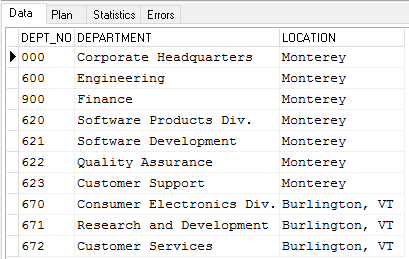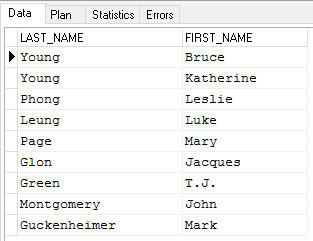InterBase Quick Start: Part IV - Pattern Matching
Go Up to InterBase Quick Start: Part IV - Using the WHERE Clause
Besides comparing values, search conditions can also test character strings for a particular pattern. You can use wildcards to define patterns:
- % (a percent sign): Match zero or more characters.
- _ (an underscore): Match a single character.
The table below provides examples of some common patterns. All conditions except CONTAINING are case sensitive.
WHERE Clause
|
Result |
|---|---|
WHERE last_name LIKE '%q%'
|
Last names that contain at least one |
|
|
Last names that begin with the letters |
|
|
Last names that contain at least one |
|
|
Last names that begin with letters alphabetically between (and including) |
 Using LIKE
Using LIKE
-
LIKEis case sensitive and accepts wildcards. Enter the following statement to find all employees whose last name ends inan.SELECT last_name, first_name, emp_no FROM Employee WHERE last_name LIKE '%an'
The image below shows the expected result:
- Now enter the following
SELECTstatement to find employees whose last names match the pattern:- Begin with an
Mcharacter. - Followed by two characters.
- Then a
Dcharacter. - Followed any or none characters.
SELECT last_name, first_name, emp_no FROM Employee WHERE last_name LIKE 'M__D%'
The image below shows the expected result:
- Begin with an
- The
%wildcard matches zero or more characters. The following query returns rows for last namesBurbank,Bender, andBrown.SELECT last_name, first_name, emp_no FROM Employee WHERE last_name LIKE 'B%r%'
The image below shows the expected result:
 Using STARTING WITH
Using STARTING WITH
The STARTING WITH operator tests whether a value starts with a particular character or sequence of characters. STARTING WITH is case sensitive and does not support wildcard characters.
- Use the following statement to retrieve employee last names that start with
Le:SELECT last_name, first_name FROM Employee WHERE last_name starting WITH 'Le'
The image below shows the expected result:
- To negate the
STARTING WITHoperator, precede it with the logical operatorNOT.SELECT dept_no, department, location FROM Department WHERE dept_no NOT starting WITH '1'
The image below shows the expected result:
 Using CONTAINING
Using CONTAINING
The CONTAINING operator finds results that contain a particular character or sequence of characters. CONTAINING is not case sensitive and does not support wildcards.
- Enter the following statement to find last names that contain a
gor aGcharacter.SELECT last_name, first_name FROM Employee WHERE last_name containing 'G'
The image below shows the expected result:
- To confirm that the
CONTAININGoperator is not case sensitive, modify the previous query to specify a lowe-casegin the condition.SELECT last_name, first_name FROM Employee WHERE last_name containing 'g'
You can see that the result is the same in both cases.





